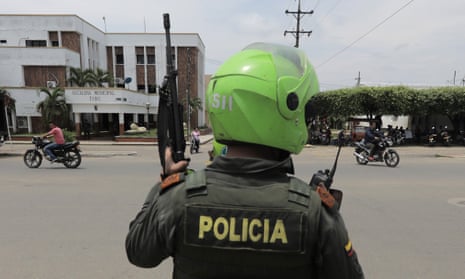The murder of two boys for allegedly shoplifting in Colombia has evoked memories of some of the country’s darkest days of armed conflict.
The pair, who were 12 and 18, were allegedly trying to rob a clothing store in Tibú, a small town near the Venezuelan border, last Friday when they were apprehended by bystanders who taped their hands together, according to witnesses quoted by local media.
CCTV footage showed that soon after, two men armed with pistols arrived on motorbikes and seized the boys, both believed to be Venezuelan citizens. Hours later their bodies were found on the roadside at the edge of town, with bullet holes in their heads. The youngest was reportedly left holding a handwritten sign with the word “thief”.
Venezuela’s attorney general, Tarek Saab, has called on his Colombian counterpart to determine who was responsible for the murders.
The incident has reminded many Colombians of the ugliest days of conflict when leftist rebels and rightwing paramilitaries would impose their own strict codes of behaviour in towns they controlled.
Those days were thought to be over when Colombia’s government signed a peace deal five years ago with the Revolutionary Armed Forces of Colombia (Farc), formally ending five decades of civil war that had killed more than 260,000 people and displaced millions.
That deal was supposed to enable development in neglected areas such as Tibú and the surrounding Catatumbo region, where poor farmers often grow illegal coca, the raw material of cocaine. But the situation is often worse now than it was before, with dissident Farc groups and drug traffickers battling against the Colombian army while imposing harsh rules on the civilians caught in the middle.
“Each armed group in Tibú imposes control using violence, and the first people that always suffer their weapons are those with social issues, criminal records, drug problems, or those working in prostitution,” said Wilfredo Cañizares, who heads Fundación Progresar, a human rights group in the region. “This is the third case we’ve reported in which people are effectively being lynched.”
Authorities have offered a US$27,000 reward for information that leads to the murderers’ capture, while the United Nations mission in Colombia called on authorities to quickly investigate. Police have said the murder was carried out by dissident Farc members thought to operate in the region.
